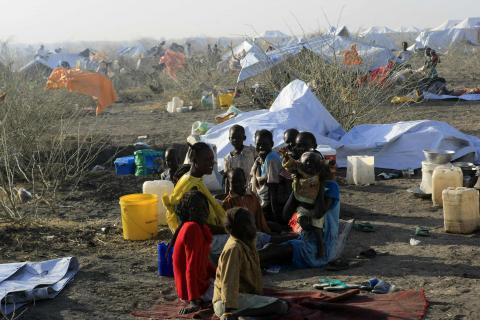Advertisement
South Sudan children survive on waterlilies as crisis escalates
LONDON (Reuters) - Around 1 million children in South Sudan have been forced to flee their homes since conflict erupted a year ago, some are surviving on waterlily roots, and there may be famine next year, the U.N. children's agency warned on Friday.
Some 12,000 children are being used by armed groups and others are increasingly vulnerable to violence, sexual abuse and exploitation, the agency added.
"The situation on the ground is horrific," UNICEF spokeswoman Doune Porter said from the capital Juba. "Time and again I hear colleagues who've worked in many other emergencies saying 'we've never seen anything this bad'."
Fighting between government and rebel forces, which began on Dec. 15 last year, has killed more than 10,000 people in the world's newest state, reopening fault lines among ethnic groups.
Almost 750,000 children have been internally displaced and more than 320,000 have fled to neighboring countries. Some 400,000 are out of school and child malnutrition rates have more than doubled, UNICEF said.
"South Sudan narrowly missed falling into famine this year," Porter said. "We are in the harvest season now … but all the stocks are very, very much depleted compared to last year.
"Last year when we got into the lean season we were in crisis and emergency levels. For the next lean season things are looking very, very precarious. If the fighting escalates, which there are certainly very great fears that it will do, then the outlook is dreadful."
In one central region, Porter said she had seen people surviving purely on "stews" made from ground-up dried waterlily roots.
Nearly 2 million people have been uprooted by the war between supporters of President Salva Kiir and those of his sacked deputy and rival, Riek Machar. Most of the internally displaced are in remote areas with no humanitarian assistance.
Aid groups have had difficulty reaching many areas because of the fighting and the lack of tarmac roads in South Sudan, which seceded from Sudan in 2011 after a long civil war.
Operations are scaling up following the end of the rainy season during which dirt roads and landing strips were unusable.
In Bentiu in the north, Porter said 40,000 people had ended up living knee-deep in sewage-contaminated floodwater during the rainy season after fleeing heavy fighting. "Parents were sometimes standing overnight holding their children in their arms because there was no place to put them down," she added.
UNICEF, which is beefing up its response in the contested states of Jonglei, Unity and Upper Nile, needs around $166 million to fund its emergency operation in 2015.
Porter said the long struggle for South Sudan's independence meant much of the population had missed out on school, leaving the country particularly vulnerable when it split from Sudan.
"We cannot risk having another generation of children who are not in school," she added.
(Reporting by Emma Batha, Editing by Tim Pearce)



















Add new comment